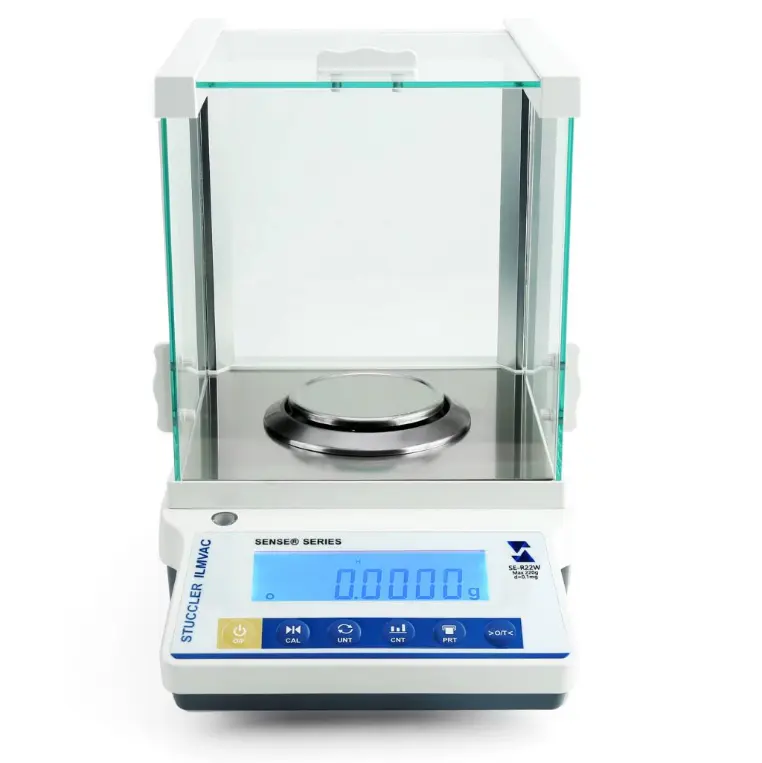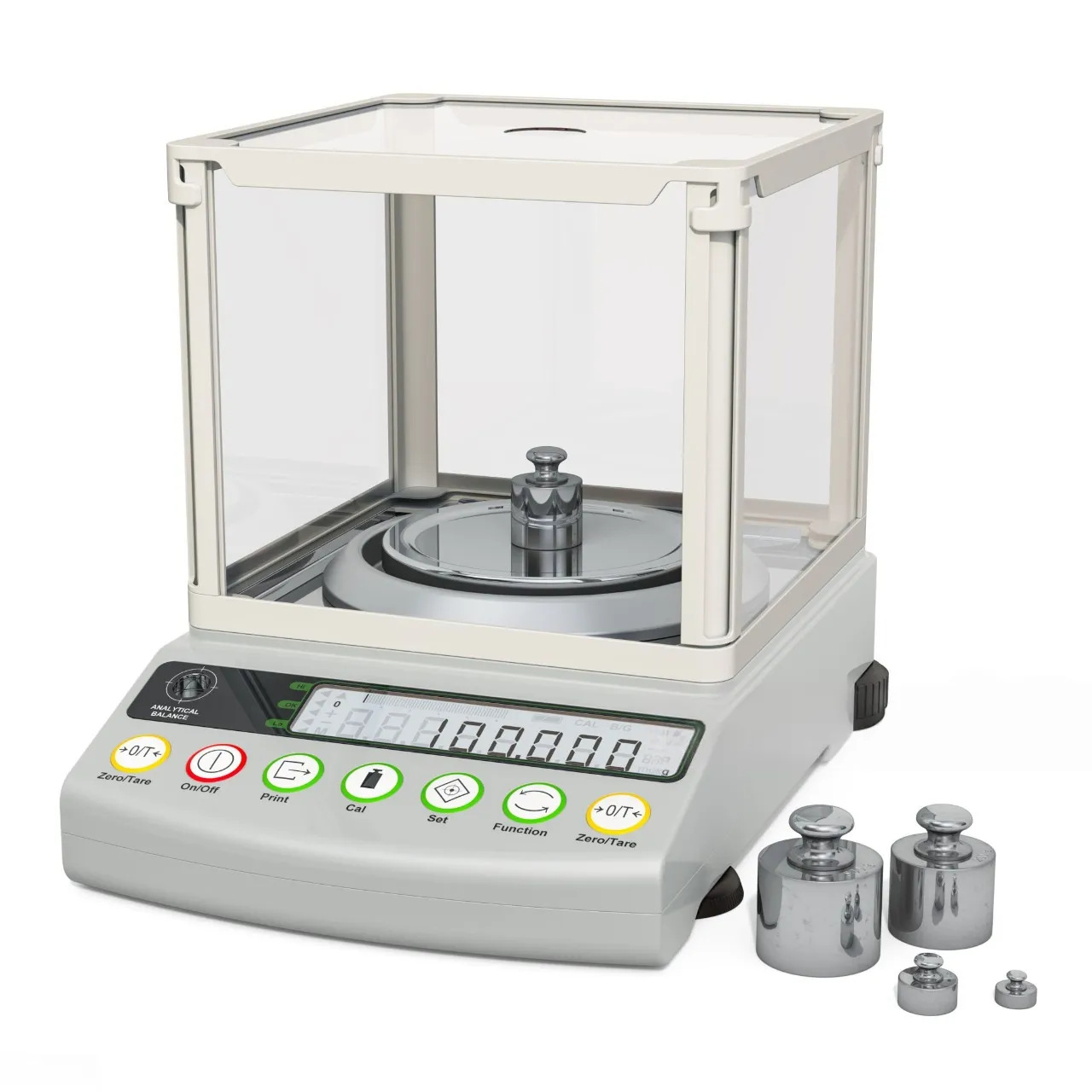Why You Need a Professional Jewelry Scale
When working with precious metals, gemstones, or fine jewelry, precision is non-negotiable. Unlike kitchen or postal scales, professional jewelry scales deliver pinpoint accuracy, measuring down to hundredths or even thousandths of a gram. Even the slightest weight difference can significantly impact a piece’s value, making these scales essential for jewelers, hobbyists, or anyone verifying a collection’s worth. They ensure fair transactions and accurate valuations while supporting specialized units like carats (ct) and pennyweights (dwt), which are industry standards.
How to Choose the Right Jewelry Scale: Key Factors
Accuracy: The Heart of the Matter
Accuracy is the most critical factor when selecting a jewelry scale, and your choice depends on what you’re weighing.
- 0.01g Accuracy: Perfect for most jewelry, such as gold or silver rings, necklaces, and bracelets. This level of precision suits general appraisals and sales.
- 0.001g Accuracy (Milligram Scales): Essential for high-value, lightweight items like diamonds, gemstones, or fine powders. These scales often include a draft shield to block air currents, ensuring ultra-precise readings.
Maximum Weight and Unit Conversion
Start by estimating the maximum weight you’ll need to measure. Most personal jewelry scales handle 50 to 100 grams, ideal for individual pieces. For larger items or bulk weighing, opt for a higher-capacity model.
Next, ensure the scale supports unit conversion. A quality jewelry scale should seamlessly switch between industry-standard units:
- grams (g)
- carats (ct)
- ounces (oz)
- pennyweights (dwt)
- grains (gn)
Features for Ease and Efficiency
Look for features that streamline your work and boost accuracy:
- Tare Function: Subtracts the weight of a container, giving you the item’s net weight.
- Clear Display: A backlit LCD screen ensures readability in any lighting.
- Calibration: Scales can drift over time. Models with a calibration function and included calibration weight let you restore factory-level precision.
Top Brands and Recommended Models
1. Affordable (Entry-Level) Scales
These budget-friendly options suit hobbyists, crafters, or beginners who want reliability without breaking the bank.
- Smart Weigh
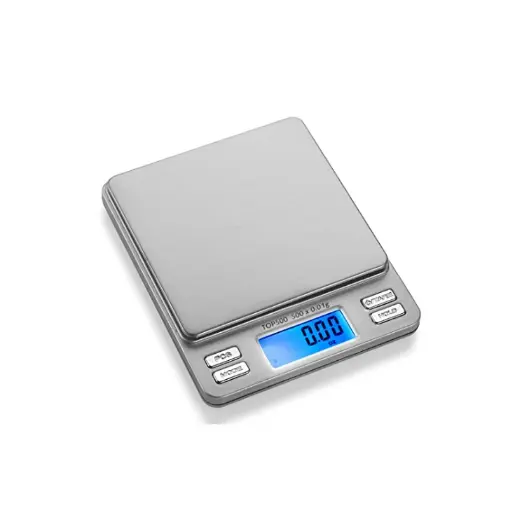
- Recommended Model: Smart Weigh Digital Pro Pocket Scale
- Features: Delivers 0.01g accuracy, a stainless-steel platform, and a bright LCD display. Its compact design and protective cover make it ideal for home use.
- Use Case: Great for small jewelry projects or verifying weights at home.
- Fuzion
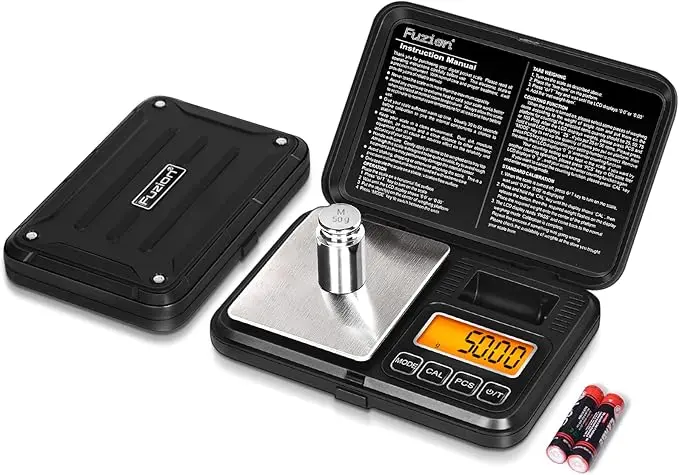
- Recommended Model: Fuzion Digital Pocket Scale
- Features: Offers reliable 0.01g precision, includes a calibration weight, and comes with a durable case that doubles as a weighing tray.
- Use Case: Perfect for new jewelers needing a dependable, affordable scale for their workshop.
2. Professional (High-Precision) Scales
For professional jewelers, gemologists, or appraisers, a high-precision scale is a must-have tool.
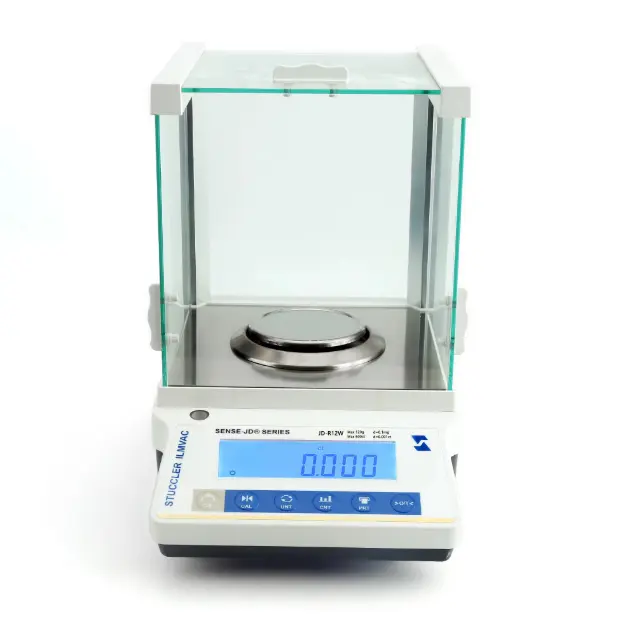
- Recommended Model: Stuccler JD Series
- Features: Provides exceptional precision, with some models measuring to 0.001g. Includes a robust draft shield to block air interference and a stable, spacious weighing platform.
- Use Case: Ideal for professional environments like diamond grading, gemstone valuation, or high-volume jewelry production where accuracy is critical.
3. Portable Scales
For professionals on the move, portable scales offer convenience without sacrificing precision.
- My Weigh
- Recommended Model: My Weigh iBalance 101
- Features: Compact and foldable for easy transport, this scale maintains accuracy with multiple unit options and a tare function.
- Use Case: Perfect for traveling appraisers, trade show vendors, or anyone weighing jewelry away from their main workspace.
Maintenance Tips for Long-Lasting Performance
To keep your jewelry scale accurate and reliable, follow these tips:
- Use a Stable Surface: Place the scale on a flat, level surface to avoid skewed readings.
- Minimize Vibrations and Impact: Handle the scale gently and keep it away from vibrations, which can damage its sensitive sensors.
- Clean Carefully: Wipe the scale with a soft, dry cloth. Avoid harsh chemicals that could harm the display or body.
- Store Properly: When not in use, keep the scale in its case or original packaging in a cool, dry place away from sunlight.
Frequently Asked Questions (FAQ)
1. Q: Why are my scale’s readings unstable?
A: Unstable readings often stem from an uneven surface, nearby airflow (like a fan or AC), or static electricity on the weighing pan. For high-precision scales, use the draft shield and avoid vibrations to ensure steady measurements.
2. Q: Why doesn’t my new scale show “0.00” when I turn it on?
A: This is normal. Press the “Tare” or “Zero” button to reset the display to zero before weighing for accurate results.
3. Q: Why should I calibrate my scale regularly, and is it hard?
A: Over time, a scale’s sensors can drift, affecting accuracy. Calibration restores precision and is simple: just follow the manual and use the included calibration weight.
4. Q: Should I get a battery-powered or USB-rechargeable scale?
A: Choose battery-powered for travel or areas without outlets. For a fixed workspace, USB-rechargeable or plug-in models save you the hassle of replacing batteries.
5. Q: Does the weighing pan’s material matter?
A: Yes. Stainless steel pans are durable, easy to clean, and corrosion-resistant, making them ideal for professional use. Plastic pans are lighter and cheaper but less sturdy, so opt for stainless steel when weighing valuable items.
6. Q: What else should I consider besides accuracy?
A: Look at maximum weight capacity to handle your items, unit conversion for flexibility, and a tare function for convenience. Also, choose a reputable brand with solid customer support.
7. Q: Are expensive high-precision scales worth it?
A: For professional jewelers or gemologists weighing high-value items like gemstones, a high-precision scale is a smart investment for accurate valuations. Hobbyists can usually get by with 0.01g accuracy.
8. Q: Why do some scales have a glass draft shield?
A: Scales with 0.001g accuracy are highly sensitive to air currents (even from breathing). A draft shield blocks these disturbances, ensuring precise measurements.
9. Q: What if my scale gets wet?
A: Turn it off immediately, remove the batteries, and wipe it dry with a cloth. Let it air-dry in a ventilated area for a few days. Avoid using a hairdryer, and contact customer service if issues persist.
10. Q: How long do jewelry scales last?
A: With proper care—avoiding impacts, cleaning regularly, and calibrating as needed—a quality scale can last years. Reputable brands often offer better durability.
Conclusion
Choosing the right jewelry weighing scale comes down to understanding your needs for accuracy, weight capacity, and features. Whether you’re managing a personal collection, running a small business, or working in a professional lab, a reliable scale is an indispensable tool for precision and confidence.


